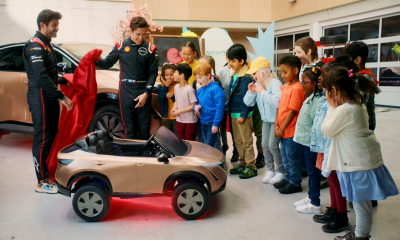What kind of parent are you?
Do you tell your kids yes or no more often?
Published
2 years ago onBy
Talker News
By Charlie Bayliss via SWNS
Are you a pushy parent who is always telling your children no? Or are you a free spirit who will always say yes to their kids, no matter what?
This calculator reveals just how many times you will tell your kids yes and no before they turn 16 – and how you stack up against other parents.
Whether you let your kids stay up past their bedtime or if it’s strictly no sweet treats, it will reveal whether you’re the fun mom or overbearing dad.
The tool was developed after research found parents say no to their children 8,395 times a year – with staying up late, having sweets before bed and buying something when shopping likely to get the negative response.
A survey of 2,000 parents of children aged one to 16-years-old, revealed they reject their kids' questions and queries an average of 23 times a day.
But dads are more likely to tell their children both yes and no compared to moms, according to research commissioned by kids’ camp and family adventure holiday provider PGL.
Nearly two thirds (64 percent) repeatedly say no to their child for the same request, over and over again.
Of those who felt they say no too often, 54 percent said they did it to help them understand they can’t get everything.
While 37 percent don’t want their kids to be spoilt, and 34 per cent do it to protect their kids.
The most common things they are told no for includes staying up past bedtime (29 percent), sweets before bed (29 percent) and buying something every time the family is out shopping (26 percent).
However, it emerged parents will say yes more often than no, a total of around 8,800 times a year.
The top reason for saying yes was that it is the easiest option (42 percent), but 32 percent want to let their child feel in control of their own decisions.
And a fifth have tried to raise their child in an environment where they are never told no, and always answered in a positive manner.
Parenting expert Anita Cleare, author of "The Work/Parent Switch and Positive Parenting Project," said: “It’s natural for parents to want to protect our children and smooth the obstacles in their paths.
“However, facing challenges and trying something new is really important for building children’s self-esteem and resilience.
“Children need opportunities to stretch themselves and take on challenges in safe and secure environments.
"By letting children take on a challenging activity, we send them the signal that we believe in them – and that, yes, they can do it.”
The study also found the things parents have a hard time saying no to, including snacks between meals (12 percent), sleeping in bed with mom and dad (11 percent) and putting off their homework until later (eight percent).
But 71 percent of parents polled by OnePoll believe kids who are always told yes will end up spoiled, with the age of three deemed the most difficult age to get kids to accept a no.
And 32 percent have a good cop, bad cop approach to parenting with their partner – where one is strict, and the other is more relaxed.
Age also made a difference, with 38 percent of parents of children aged eight to 16 believing they say yes to their child too often, compared to 31 percent of those with children aged seven and under.
Anita Cleare added: “Saying no is an important way to help children learn boundaries and to realize they can’t always have everything they want, and keeping children safe is high on a parents’ agenda.
“Becoming resilient and believing in yourself requires children to take some risks in childhood.
"This might be just a safe risk in play – like seeing how high you can go on the swings – or learning to do something independently without parents present.
"Or facing your fears in an adventurous activity like abseiling or a high ropes course.
“These moments of challenge and triumph help build children’s confidence.”
Anthony Jones, CEO of PGL, which offers adventure camps for children aged eight to 16, as well as family adventure holidays, said: “It’s interesting to see modern parents say yes to their children more than no – as a parent I know how difficult it can be to keep repeating yourself when children make the same request on a loop.
"But giving children the scope to be themselves is important, and an independent holiday where they can grow their own self-belief, independence and confidence away from home can prove crucial in their development.
"PGL challenges parents to let their children have this independent adventure – and we often hear it’s the parents who are nervous about letting them go.”
THE TOP 30 THINGS BRITISH PARENTS SAY NO TO THEIR CHILDREN ABOUT:
To stay up past bedtime
2. Sweets just before bed
3. Buying something every time you go shopping
4. More screen time in general
5. Putting off homework until later
6. Having the iPad at bedtime
7. Watching 18 rated films
8. Going on their phone during mealtimes
9. Having snacks between meals
10. Going outside after dark
11. To play more video games
12. Wanting to play with food – rather than eat it
13. To have a go on your phone
14. Getting a new toy
15. Having another biscuit
16. Eating sweet foods before savory
17. Having fast food for dinner
18. Going to the park alone
19. Wanting to sleep in your bed with you
20. Watching YouTube
21. Buying expensive trainers
22. Buying expensive clothes
23. Buying sweets when you are out
24. Going out without an adult
25. Watching something on TV
26. Going on a trip with friends and no parents
27. Dying their hair a crazy color
28. Having a soft drink instead of water
29. Going to the shop after school to buy sweets
30. Going outside when it's raining to avoid getting dirty
Stories and infographics by ‘Talker Research’ are available to download & ready to use. Stories and videos by ‘Talker News’ are managed by SWNS. To license content for editorial or commercial use and to see the full scope of SWNS content, please email [email protected] or submit an inquiry via our contact form.
You may like


Survey says these are the top 30 icks when it comes to food


Domino’s creates wearable heat suit using pizza box insulation tech


Survey says this is what makes the perfect wedding


You could win a chance to stay in this unique ‘wombat burrow’


The fantasies kids have about future race cars revealed


Sales of lab-grown diamonds up 2,860% in last five years
Other Stories


Pro mermaid’s career goes swimmingly after overcoming ocean fear
She makes up to $8,000 a show.


Giant prehistoric salmon used tusk-like teeth to fight off predators
The species that grew up to nine feet long lived in the North American Pacific Northwest.


Evidence of Earth’s magnetic field dates back 3.7 billion years
Life on Earth would not be possible without its magnetic field.


Adorable video shows baby rhino enjoying sunshine
By Faye Mayern via SWNS An endangered baby rhino has well and truly found its feet after being filmed playing...


Hilarious moment delivery man gets chased by tiny dog
The hilarious encounter was caught on video.
Top Talkers

 Parenting7 days ago
Parenting7 days agoSingle mom details struggles of feeding her 12 kids

 Lifestyle6 days ago
Lifestyle6 days agoWoman regrets her tattoo nightmare: ‘It’s horrendous’

 Good News2 days ago
Good News2 days agoDisabled student takes first steps in 10 years on graduation stage

 Broadcast1 week ago
Broadcast1 week agoOver 40% of Americans have no clue what a 401k is

 Health3 days ago
Health3 days agoNew study reveals ‘old age’ begins later than it used to

 Broadcast1 week ago
Broadcast1 week agoHow hard is it for Americans to live sustainably?

 Money1 week ago
Money1 week agoOver 40% of Americans have no clue what a 401k is

 Wildlife2 days ago
Wildlife2 days agoClever elephant returns visitor’s shoe after falling into enclosure
